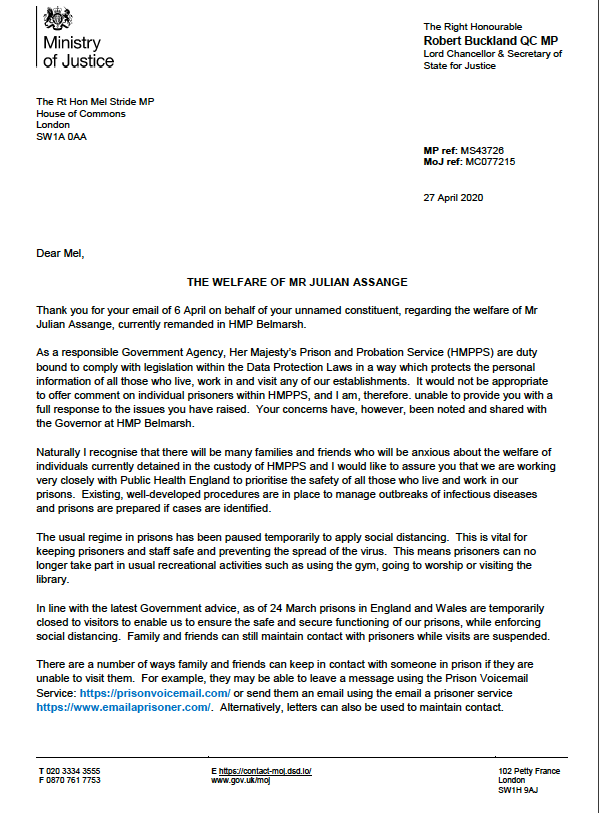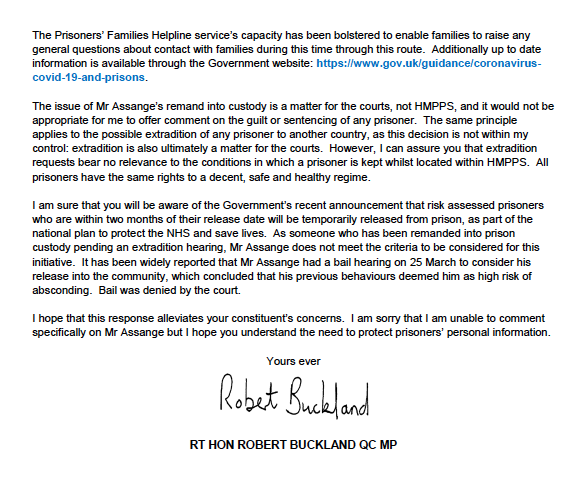Assange Could Die in Prison, There Is No Time to Lose

We write this open letter, as British medical doctors, to express our serious concerns about the physical and mental health of Mr Julian Assange. Our professional concerns follow the shocking eye witness accounts of Craig Murray and John Pilger at the case management hearing that took place on Monday 21 October 2019 at Westminster Magistrates Court. The hearing related to the upcoming February 2020 hearing of the request by the US government for Mr Assange’s extradition to the US in relation to his work as a publisher of information, including information about alleged crimes of the US government.
Having entered the Ecuadorian embassy in London in June 2012, he sought and was granted political asylum by the Ecuadorian government. In April 2019, he was removed from the embassy and arrested by the Metropolitan Police. He was subsequently detained in Belmarsh prison, where he is being kept in solitary confinement.
During the seven years spent in the embassy, Mr Assange was visited and examined by numerous experts, each of whom expressed alarm at the state of, and the effects of his confined living conditions on, his health, and requested that he be allowed access to a hospital. No such access was permitted, and Mr Assange was unable to exercise his right to free and necessary expert medical assessment and treatment throughout the seven-year period.
- In late 2015, Mr Assange’s doctor reported concerns about his physical condition and requested that he be allowed to receive hospital treatment.
- An Opinion of the United Nations Working Group on Arbitrary Detention was formally adopted on 4 December 2015, and concluded that Mr Assange was being arbitrarily detained by the Governments of the UK and Sweden. Crucially, it was made clear at the time by the Working Party that any continued arbitrary detention of Mr Assange would constitute torture.
- Three clinicians – Sondra S Crosby, Brock Chisholm and Sean Love – visited Mr Assange from January 2018 onwards. The group examined him for 20 hours over three days in October 2018 and concluded that he was in desperate need of medical care.
- At the beginning of May 2019, Mr Assange was described as suffering from “moderate to severe depression”, and, later that month, he was moved to the medical ward at Belmarsh prison following a significant deterioration in his health. This resulted in Mr Assange being too unwell to appear via video link in court for a preliminary extradition hearing.
- On 31 May 2019, Nils Melzer, the United Nations Special Rapporteur on Torture and Other Cruel, Inhuman or Degrading Treatment or Punishment, published a report based on his visit to Belmarsh prison on 9 May 2019 accompanied by two medical experts, with special expertise in assessing victims of torture. This involved a 60-minute conversation with Mr Assange, an hour-long physical examination and a two-hour psychiatric examination. Mr Melzer reported, “we all came to the conclusion that he showed all the symptoms that are typical for a person that has been exposed to psychological torture over an extended period of time.”
- Amnesty International, Human Rights Watch and the American Civil Liberties Union have published statements expressing their concern over the treatment of Mr Assange and the risks he faces if extradited to the US.
- Craig Murray, a former British Ambassador, published a detailed and shocking eye witness account of Mr Assange’s recent hearing, stating that he exhibited “all the symptoms of a torture victim.” His account was corroborated by the eye witness account of John Pilger, the renowned investigative journalist.
Medical doctors have a professional duty to report suspected torture of which they become aware, wherever it may be occurring. That professional duty is absolute and must be carried out regardless of risk to reporting doctors. We wish to put on record, as medical doctors, our collective serious concerns and to draw the attention of the public and the world to this grave situation.
It is our opinion that Mr Assange requires urgent expert medical assessment of both his physical and psychological state of health. Any medical treatment indicated should be administered in a properly equipped and expertly staffed hospital. Were such urgent assessment and treatment not to take place, we have real concerns, on the evidence currently available, that Mr Assange could die in prison. There is no time to lose.
***
Below is the response of Rt Hon. Robert Buckland QC MP.
*
Note to readers: please click the share buttons above or below. Forward this article to your email lists. Crosspost on your blog site, internet forums. etc.
Featured image: Julian Assange court sketch, October 21, 2019, supplied by Julia Quenzler.



